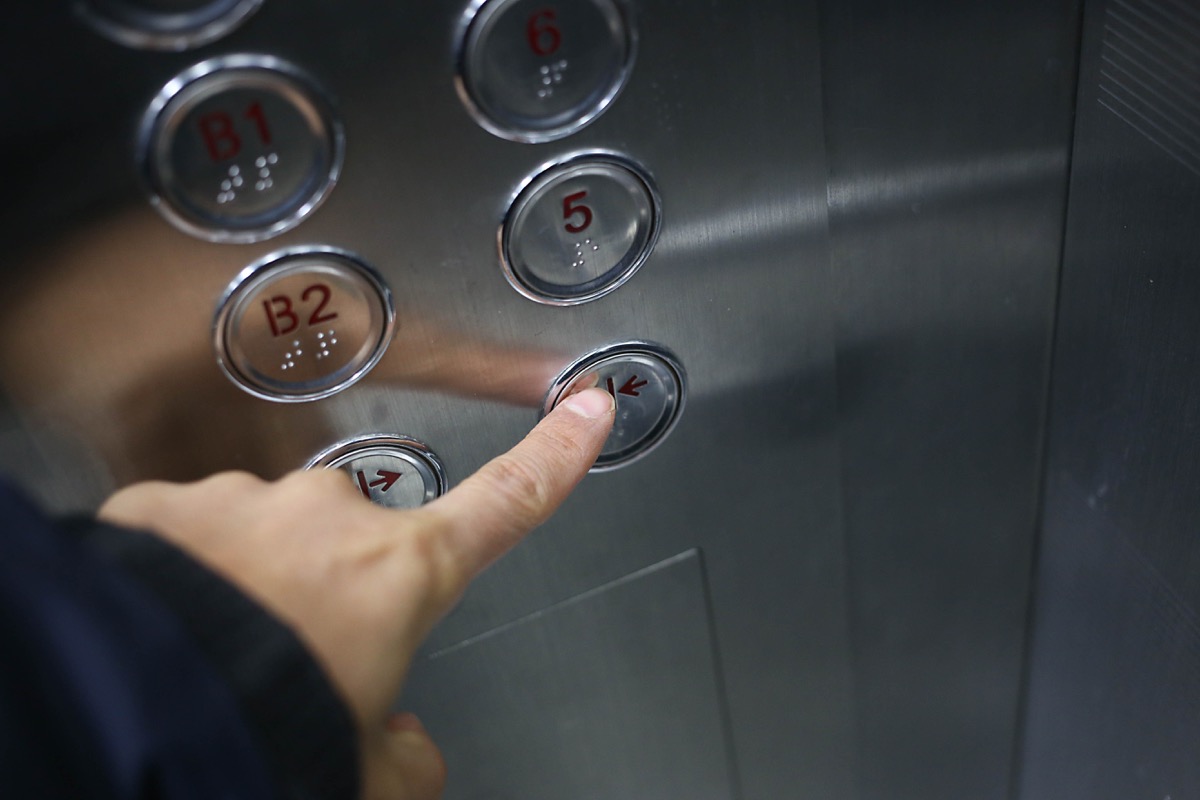For example, did you know that eating just one serving of fried food a week could increase your risk of dying from cardiovascular disease by 11 percent? Or that getting fewer than six hours of sleep a night could increase your risk of critical plaque buildup by 27 percent? To help you stay on top of your game, we’ve called in the experts to learn the daily habits that ruin your heart. And for more ways to maintain a healthy ticker, be sure to watch out for these 30 Warning Signs Your Heart Is Trying to Send You. While it’s great that you’re getting a ton of sleep, it is possible to have too much of a good thing. According to a study published in the European Heart Journal, people who sleep between eight and nine hours a day increase their risk of dying or developing cardiovascular disease by five percent. And people who sleep more than 10 hours a day increase their risk by 41 percent. And for more information on sleep, check out 25 Myths About Sleep That Are Keeping You Up at Night. On the other hand, a lack of sleep could harm your heart too, says Stacey Rosen, MD, a cardiologist and vice president of The Katz Institute for Women’s Health at Northwell Health in New York. “The importance of a good night’s sleep for heart health is critical,” she says. According to a 2019 study published in the Journal of the American College of Cardiology, people who slept fewer than six hours a night were 27 percent more likely to have atherosclerosis—or plaque buildup in the arteries—than those who received the recommended eight hours of sleep per night. According to a study published in the Journal of the American Medical Association, your heart could really do without that wacky work schedule. The study found that among women who worked as registered nurses, long-term rotating night-shift hours were associated with a statistically significant increased risk of coronary heart disease. And for other ways you’re not getting enough rest, check out 25 Things You’re Doing That Would Horrify Sleep Doctors. As you’ve probably heard, sitting is the new smoking. “Being sedentary for extended amounts of time increases one’s risk of suffering from a heart attack,” says Stephanie Filbey, an exercise physiologist, personal trainer, and owner of Summit Wellness, LLC in New Jersey. “That morning workout is great, but it’s not enough. We need to make it a point to move around throughout the day as well.” If you avoid getting out in nature, you’re doing your heart a disservice. According to a 2015 review of research published in Current Epidemiology Reports, people who were exposed to higher levels of “greenness” had a decreased risk of cardiovascular disease. It’s just another reason to take a stroll through the park at lunch or add a weekend hike to your regular routine. And for more reasons to get outdoors this season, make sure you know the 5 Side Effects of Not Going Outside Enough. You already know that fried food isn’t exactly good for you—but it turns out even a tiny amount could have a lasting effect on your health. According to a study published in the British Medical Journal, women who ate just one serving of fried chicken a week had an 11 percent increased risk of death from cardiovascular disease (the study didn’t include men). While it’s completely normal to get angry every once in a while, letting your anger boil over on a regular basis can do some serious damage to your heart. In fact, according to a 2014 study published in the Journal of Cardiac Failure, constant episodes of intense anger can exponentially increase a person’s risk of cardiovascular events, especially in men. While it might seem healthier than drinks with real sugar, diet soda still puts you at risk for heart disease. According to one 10-year study published in 2012 in the Journal of General Internal Medicine, people who drank diet soda on a daily basis were more likely to develop cardiovascular disease than people who stayed away from it entirely. Even a small amount of dehydration can make it more difficult for your heart to do its job. According to a 2017 study published in the European Journal of Nutrition, minor dehydration caused by a moderate workout can significantly impair endothelial function. Studies have found that endothelial dysfunction precedes the development of atherosclerosis (that buildup in your arteries), according to Cedars-Sinai Medical Center. The stressors you encounter at work can affect more than just your mental health. According to a 2009 study published in the Journal of Occupational and Environmental Medicine, employees who deal with an incompetent, inconsiderate, secretive, or uncommunicative boss were 60 percent more likely to suffer a heart attack. On the flip side, those who felt they had a “good” boss were 40 percent less likely to suffer a cardiovascular event. Are you skimping on sex? If so, research published in the American Journal of Cardiology could persuade you to push play on the Marvin Gaye. According to the study, those who have sex less than once a month are much more likely to suffer from cardiovascular disease than those who have sex two or more times a week. And if you’re stuck at home right now, check out Doing This One Thing While Working From Home Can Improve Your Sex Life. Low levels of magnesium are one of the best predictors of heart disease, according to a research review by scientist Andrea Rosanoff, PhD. “The heart has the highest amount of magnesium in the whole body,” says Carolyn Dean, MD, author of Atrial Fibrillation: Remineralize Your Heart. “It’s necessary to keep the muscles of the heart from going into spasm and to keep the heart rhythm balanced—yet magnesium isn’t even tested on a regular blood electrolyte panel.” You can keep your levels in check by eating magnesium-rich foods or taking a daily multivitamin. Low levels of vitamin D have also been linked to heart disease. In fact, according to a 2018 meta-analysis published in the Journal of Clinical Hypertension, vitamin D deficiency has been linked to several types of cardiovascular disease, including coronary artery diseases like angina and heart attack. Additionally, the data showed that people with low levels of vitamin D were found to have an increased risk of ischemic heart disease and early death. Your daily dental routine could either help or hurt your heart, says Jeffrey Sulitzer, DMD, the chief clinical officer of Smile Direct Club, which produces 3D-printed clear aligners. “Brushing at least three times a day and flossing once a day can reduce chronic inflammation of the gums and supporting tooth structures,” he says. “Studies over the past 15 years have shown that if patients reduce the chronic inflammation that gum disease causes by having good oral hygiene, they can also have a positive effect on their diabetic, heart, and overall health condition.” And for more on how your oral hygiene affects your heart, check out This Is What Happens to Your Body When You Don’t Floss Your Teeth. Want to keep your stress levels low in order to keep your heart healthy? Do more of the things you love with the people you love. “Stress can be improved through behavior change,” says David Gregg, MD, the chief medical officer at Stay Well, a workplace wellness company. “Engaging in activities with friends helps increase the amount of movement and exercise an individual completes each day. Something as simple as taking a [socially distanced] walk with a friend… or even taking [online] dancing lessons helps to keep the body moving.” While seeing friends and family face-to-face is difficult right now, there are plenty of virtual meet-ups and classes you can take to connect with your loved ones. Even if you simply consider yourself to be a “social smoker,” you’re still hurting your heart. “Other than food and exercise, the next biggest thing that can have detrimental effects on heart health is smoking and vaping,” says Ashley Wood, RN, BSN, contributor at Demystifying Your Health. “Since both of these contain nicotine, they aren’t good for your body. Nicotine causes your arteries to constrict in the short-term and after this happens repeatedly, the arteries start to harden. If you combine this with plaque buildup, you’re greatly increasing your chances of having a heart attack.” It’s easy to use mindless snacking to survive a stressful situation or to curb boredom—but according to Jason Reed, a pharmacist and the author of Prescription for Maximum Savings, overeating could do significant damage to your heart. “Most people think that fatty foods are bad for your heart,” he says. “Really they are not, so long as you eat a well-balanced diet. What is more problematic is overeating consistently. Taking in more calories than you need leads to weight gain. This weight gain leads to diabetes and high blood pressure. Ultimately, it causes the right side of the heart to have to pump harder, and over time, that causes heart failure.” If you find yourself in a constant state of worry, you might want to bring it up to your doctor before it ruins your heart. “Cortisol is the hormone that is released in response to stress or worries,” says Reed. “If you are constantly in a state of stress or worry, then you have this hormone around way too much. Cortisol in extended doses can cause the heart to have to pump harder than it should.” If you’re feeling stressed, check out This One Simple Exercise Can Help Ease Your Anxiety. If you’re truly opposed to drinking your coffee without sweetener, you might want to reach for the real stuff as opposed to an artificial option. In a study published in the Canadian Medical Association Journal, researchers found that those who consume artificial sweeteners had a higher incidence of obesity, hypertension, metabolic syndrome, type 2 diabetes, and cardiovascular events than those who didn’t. For your heart’s sake, you might want to curb your consumption of salt, too. In a 2019 study published in the Journal of the American Heart Association, Chinese researchers discovered that 20 percent of all cardiovascular deaths that occurred in Shandong, China, in 2011 were due to high sodium intake. This statistic makes sense when you look at why sodium is so dangerous. “Foods that are high in sodium cause our bodies to retain water, which makes it harder for the heart to pump blood,” says Wood. Though your snoring may seem relatively innocuous, it could be a serious sign of sleep apnea that might lead to more complicated health issues down the road. In fact, according to the American Heart Association, sleep apnea has been linked to high blood pressure, arrhythmia, stroke, and heart failure. If you want to ensure that your heart stays as healthy as possible, then take the stairs, says Mark Peterman, MD, a cardiologist at Texas Health Plano. “The stairs are an underrated way to work aerobic exercise into your day,” he says. The stairs are also a lot safer than an elevator, where you’re in a small, enclosed space with strangers who might be carrying the coronavirus. Besides taking the stairs, consider adding a true cardio workout to your routine. According to one 2018 study published in JAMA Network Open, cardiorespiratory fitness is associated with a longer lifespan. Career changes are incredibly stressful—and if your switches involve a change in income, they can be even more so. One 2019 study published in the journal Circulation found that those who experienced extreme income volatility were twice as likely to suffer from cardiovascular issues when compared to those who were financially stable. While you may assume that your drinking habit only affects your liver, it can hurt your heart, too. According to the CDC, “drinking too much alcohol can raise blood pressure levels and the risk for heart disease. It also increases levels of triglycerides, a form of cholesterol, which can harden your arteries.” To keep your heart in tip-top shape, the CDC recommends that women consume no more than one glass of alcohol a day and men consume no more than two glasses per day.ae0fcc31ae342fd3a1346ebb1f342fcb According to a 2017 scientific analysis published in the International Journal of Preventative Medicine, your affinity for red meat (like beef or lamb) could be putting your heart health at risk. In their review, researchers concluded that many studies showed that a high intake of red meat (at least one serving per day) is associated with an elevated risk of heart disease. If you live in a bustling city full of noise pollution, constant exposure to high-decibel noise can harm your heart. According to a 2018 review published in the Journal of the American College of Cardiology, frequent exposure to loud noise can result in vascular dysfunction, autonomic imbalance, and metabolic abnormalities—all maladies that can increase a person’s susceptibility to cardiovascular events. While getting the proper amount of exercise each week can be a great way to keep your heart healthy, it is possible to overdo it. In fact, one 2012 study published in the journal Mayo Clinic Proceedings found that chronic extreme exercise (especially for those with genetic risk factors) can lead to heart damage and rhythm disorders. So, how much is too much? According to MedlinePlus, you’ll know that you’ve hit your threshold when you begin feeling tired, experiencing extreme mood swings, and have trouble recovering from things like colds and injuries. And for more reasons to tone down your intense workout regimen, check out these 25 Amazing Health Benefits of Walking.
























